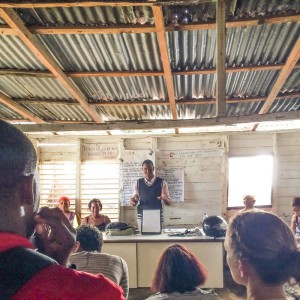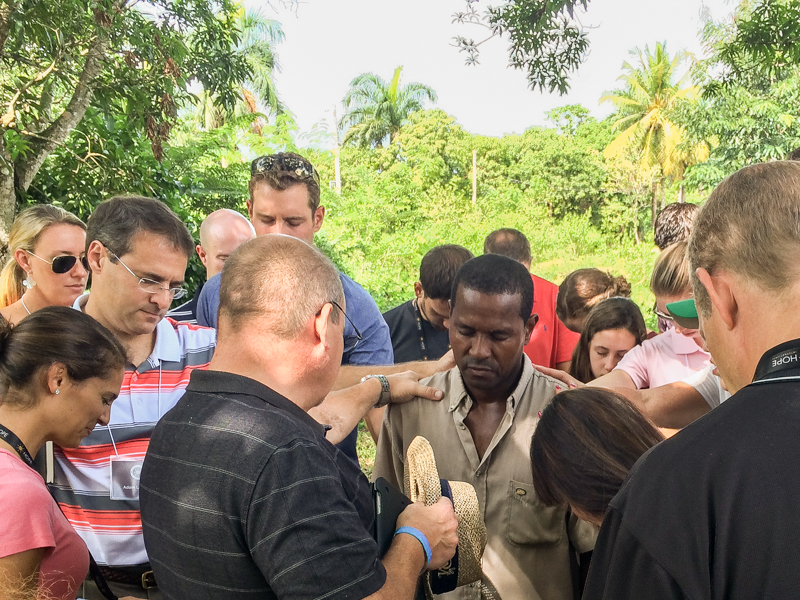by Annie Rose Ansley, HOPE Trips Liaison
In the last few years, more and more information has been shared about the harm that can come from short-term mission trips, or, as they have been dubbed, “voluntourism.” We’ve heard the negatives: $2 billion spent annually, paternalistic attitudes reinforced, cycles of dependency created, construction work “invented” for visitors, and dignity stripped.
But I believe short-term trips can be done well. Here in the Dominican Republic, I work with groups who come from the U.S. to witness what God is doing through the microfinance work of HOPE International’s local partner, Esperanza International. We visit loan repayment meetings, spend time in clients’ businesses and communities, study the Word together, and share meals with local staff members. Distinct from what many of us think of as the typical mission trip, the focus isn’t what the visitors do but what they learn.
I’ve seen these trips be positive, powerful experiences—both for the visitors and for those we visit. And so, based on my limited experience, I’d like to humbly make a few recommendations:
1. Remember you are there to learn. Upon seeing a group of Americans, people may immediately assume that you’ve arrived to give handouts or “fix something.” That’s why on a HOPE trip we always start by introducing ourselves as a group who has come to learn. It’s an unparalleled experience to hear firsthand why clients chose to join Esperanza, how they’ve invested their loans, and the effect better savings can have on their families, communities, and dreams for the future.
2. Recognize your limited perspective in a new context. If you were visiting a community and saw people drinking river water, you might understandably be shocked and worried. You might want to rush up and warn them, give them guidance, and jump into action by passing out water filters. What you might not see is the broken-down well nearby—a well abandoned due to a lack of maintenance and expertise.

Examples of well-intentioned aid gone awry abound in developing countries. While you may witness problems (I’m not denying that river water is bad for you!), it’s important not to jump directly to how to solve these problems. Remember that while you’ve been there a couple days, the organization you’re with has been on the ground for years, partnering with those in the community who have a much more complete understanding of their situation. And God’s got us all beat. He’s always been there, working, and He always will be long after we’re gone.
3. Have expectations for your trip, but not rigid ones. Take time to honestly evaluate what you want to get out of the trip (and what you’re willing to put into it!). What do you expect to learn, see, and do? Then, recognize that your actual experience may differ. On the first day of a trip, I always hand out copies of our agenda and let everyone know that if we actually end up following each piece of that agenda, I’ll be amazed. (Gotta love Dominican time!) Without flexibility, culture shock can easily end up sucking the joy out of your visit.
4. Step out of your comfort zone. A short-term trip—whether it’s three days or three months—goes fast. Make the most of your time by being willing to step up and ask questions, volunteer to pray for someone, or start a conversation with your best high school Spanish skills. If nothing else, you’ll at least be able to share a laugh with someone.
Remember that taking risks on your trip means following the promptings of the Spirit. It doesn’t mean eating cow tongue just so you can take a picture and tell everyone at home. (Okay, that was me … and it wasn’t worth it.)
5. Take something home with you. I always encourage groups to bring back one specific story, one way they’d like to live differently once they’re home. When we’re impacted powerfully, it’s easy to make promises about how our lives will never be the same. But the demands of our busy schedules often take over, and it’s easy to return to normalcy by the time our sunburn has faded.
So commit to being intentional. Give yourself visual reminders (like a picture on the fridge), pray daily for the people you met, get involved in a local ministry, or share your experience. And that way, when people ask what you were doing out of the country, you’ll have more to talk about than just eating cow tongue.
If you want to learn more about short-term trips, check out:
Peter Greer’s blog – 5 Actions After Your Mission Trip
HOPE’s website – More about HOPE Trips
RELEVANT Magazine – Things No One Tells You About Going on Short-Term Mission Trips
 Annie Rose serves as HOPE Trips liaison in the Dominican Republic. She feels blessed to get to know clients and hear their amazing stories firsthand. Annie loves being outside (especially if she’s running or at the beach!); cooking and eating; and spending time with her husband, Hamilton.
Annie Rose serves as HOPE Trips liaison in the Dominican Republic. She feels blessed to get to know clients and hear their amazing stories firsthand. Annie loves being outside (especially if she’s running or at the beach!); cooking and eating; and spending time with her husband, Hamilton.
















